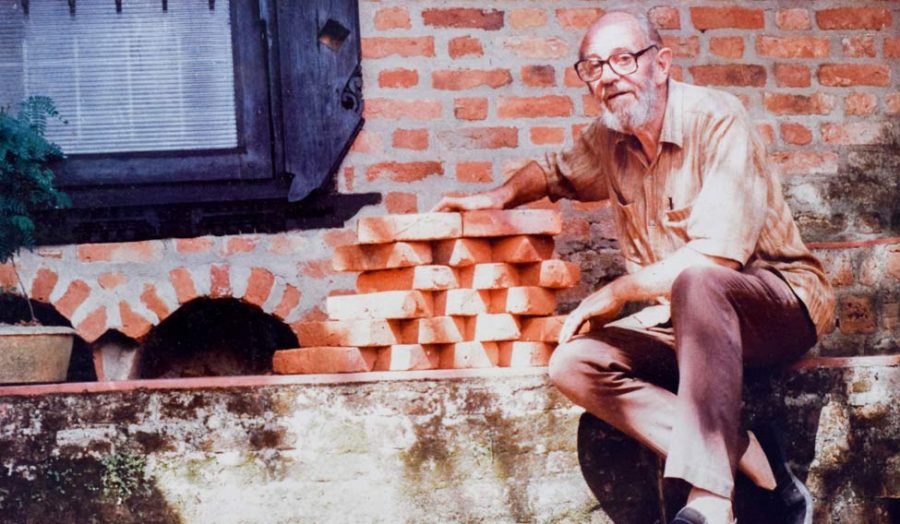In the rich mosaic of Indian architectural diversity, a cadre of forward-thinking individuals from India has embarked on the ambitious endeavor of reshaping spaces within the ever-evolving realm of architecture and has emerged as true luminaries, shaping not only the skylines of cities but also the future of design.
Table of Contents
Charles Correa: Courtyards as a Design Signature
Charles Correa, a name synonymous with modern Indian architecture, was born and brought up in Hyderabad in 1930. Growing up in a newly independent India, Charles Correa was witness to a nation on the cusp of transformation. His early education took him to St. Xavier’s College in Mumbai, where he laid the foundation for his future architectural ambition. After completing his studies in architecture at the University of Michigan and the Massachusetts Institute of Technology (MIT), Correa returned to India armed with a global perspective on architecture.
Correa’s architectural career took off in the 1950s when he started working on projects that would become iconic symbols of India’s architectural identity. His designs were not just about erecting structures but about creating environments that resonated with India’s rich heritage. One of Charles Correa’s most celebrated creations is the Jawahar Kala Kendra in Jaipur.
Indian Architect Balkrishna Doshi: Where Tradition Meets Innovation
Indian architect Balkrishna Doshi is a visionary known for his distinct style of design. He started a remarkable architectural journey that combined innovation and tradition after being born in Pune in 1927. Doshi’s educational voyage took him to the J.J. School of Architecture and later to Paris, where he imbibed diverse architectural influences.
Doshi’s way of designing buildings fits well with India. He cares about making sustainable and community-friendly designs, as we can see in projects like the Aranya Low-Cost Housing in Indore and the famous IIM Bangalore campus. In addition to creating amazing structures, Doshi teaches other architects. He’s won some impressive awards, like the big-deal Pritzker Prize, which shows how much he’s respected in the world of architecture
C. P. Kukreja: A Legacy of Innovation
With origins dating back to 1969, C. P. Kukreja Architects (CPKA) is a well-known multidisciplinary design firm. The company’s founder, C. P. Kukreja, set the groundwork for a business that would later have a big impact on India’s architectural scene while studying architecture in Melbourne and Canada.
Notable projects like the Jawaharlal Nehru University and the National Archives of India bear the hallmark of CPKA’s architectural innovation. Due to the company’s commitment to designing a wide range of projects, such as recreational spaces, embassy buildings, and institutional buildings, it has developed a solid reputation in the industry. Even after the passing of C. P. Kukreja, the firm continues to thrive, leaving an indelible mark on India’s architectural legacy.
Hafeez Contractor: Shaping India’s Skylines
Indian architect Hafeez Sorab Contractor was born in Mumbai in 1950 and is renowned for his creative designs that have influenced India’s skylines. After completing his studies at the University of Mumbai, he went to Columbia University to further his architectural skills.
The architectural contributions of contractors are reflected by notable structures such as 23 Marina, The Imperial, BITS Pilani Goa Campus, Infosys Training Centre, and many others.
He has received recognition for his creative designs, including the prestigious Padma Bhushan award in 2016. India’s urban and architectural identities are still being shaped by the works of Hafeez Contractor, whose influence on the country’s architectural landscape is immense.
Laurie Baker: Architectural Pioneer and Humanitarian

Laurie Baker (2 March 1917 – 1 April 2007) was a British-born Indian architect, celebrated for his pioneering work in cost-effective, energy-efficient designs that prioritized space, ventilation, and light. Embracing Mahatma Gandhi’s ideals and inspired by his experiences in the Himalayas, Baker championed regional building practices and local materials. His organic and sustainable approach, which dates back to the 1960s, featured innovations like rainwater harvesting and reducing the use of materials that are inefficient in terms of energy. Baker, often termed the “Gandhi of architecture,” spent over 50 years in India, becoming an Indian citizen in 1988.
Baker was good at mixing old-fashioned skills with new, cool design ideas. People know him for helping make homes that lots of people could afford. He liked using special pyramid-shaped roofs, strong brick walls with patterns (called jali walls), and other ideas to let in natural air. Baker didn’t want to call his way of doing things a “style,” but people liked it and started calling it the ‘Baker Style.’
Laurie Baker didn’t just do well in making buildings; he left behind a way of doing things that inspired a bunch of new architects. In 2006, he got some important awards, like the Padma Shri, and almost got the big Pritzker Prize. Even after he passed away in 2007, architects still look up to him for how he cared about making things last, mixing different cultures, and keeping things simple
Eugene Pandala: Eco-Friendly Indian Architect

Eugene Pandala, an esteemed Indian architect, has left an indelible mark on sustainable and environmentally conscious design. Born on March 19, 1954, in Kollam, India, Pandala is a graduate of the College of Engineering Trivandrum, where he earned his Bachelor’s in Architecture. His educational journey continued with a Master’s in Urban Design from the School of Planning and Architecture, New Delhi.
During his studies in Delhi, he met the renowned architect Hassan Fathy, who inspired him to become a leading proponent of using natural materials for construction, especially mud. In 1996, he gained public recognition for constructing his first mud house in Kollam, encompassing 2,500 sq. ft.
Pandala’s architectural style, characterized by organic forms and a deep-rooted connection to nature, has earned him numerous accolades. In 2011, he received the Laurie Baker Award from Lalit Kala Academy, and in 2007, Inside Outside Design magazine honored him as the Designer of the Year for his eco-friendly designs. Notable projects that demonstrate his proficiency in sustainable architecture are the Raviz in Kollam and the Earth Resort in Wayanad.
Achyut Kanvinde: Functionalism and Brutalism
Indian architect Achyut Purushottam Kanvinde, who lived from 9 February 1916 to 28 December 2002, was a significant figure in the development of the nation’s architectural landscape. Originating in Achra, Maharashtra, Kanvinde studied architecture at Sir J.J. School of Arts in Mumbai before continuing his studies at Harvard University with the renowned Bauhaus pioneer Walter Gropius. His career was shaped by the functionalist and brutalist movements, and in 1974 he was awarded the Padma Shri.
Upon returning to India, Kanvinde joined the Council for Scientific and Industrial Research and later co-founded the firm Kanvinde, Rai, and Chowdhury in New Delhi. The National Science Centre, the University of Agricultural Sciences’ Bangalore campus, and IIT Kanpur are just a few of the famous buildings to which the company made major contributions. Kanvinde’s design philosophy prioritized natural light, ventilation, and the harmonious blend of technological advancements with historical inspirations.
Conclusion
This exploration of pioneering architects within the dynamic realm of Indian architecture attests to their revolutionary impact on the constructed environment. Each architect, from Charles Correa, known for his distinctive designs, to Balkrishna Doshi, who seamlessly blends tradition with innovation, and from C. P. Kukreja, whose legacy is marked by innovation, to Hafeez Contractor, whose creations shape skylines, has left an enduring imprint on India’s architectural heritage.
As we conclude this inquiry, the structures, cityscapes, and environmentally sustainable practices crafted by these architects persist in shaping India’s architectural identity. Beyond reshaping physical spaces, they have evolved into symbols that guide upcoming architects toward a harmonious integration of creativity, cultural traditions, and ecological mindfulness.

